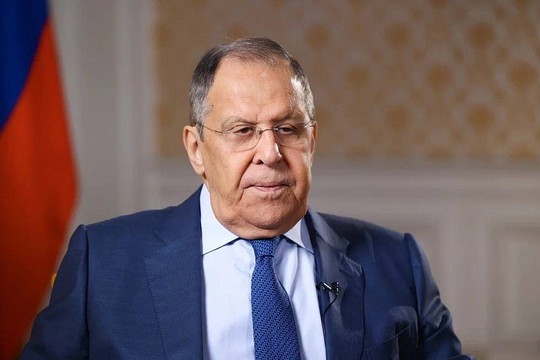Photo: MFA
Foreign Minister Sergey Lavrov’s interview for the documentary Nuremberg.
Moscow, November 16, 2025
Question: How and when did the idea emerge to set up an International Military Tribunal? What role did the Soviet Union play in organising and conducting it? Why, at the early stages of the tribunal’s creation, did Britain and the United States consider the Soviet Union’s position on the need for a trial to be irrelevant?
Sergey Lavrov: It was the Soviet Union that was the main driver in initiating discussions and then establishing the tribunal. The issue of the need to ensure the inevitability of punishment for Nazi criminals was first officially raised in a note from the Soviet side in November 1941. Similar notes quoting facts of the Nazis’ bloody and brutal crimes were sent repeatedly, including in 1942 and in 1943. In 1942, the Soviet government released a special statement which called on all countries to cooperate in the detention, search, expulsion and trial of Nazi criminals. At first, our British and American colleagues (even though the dialogue with the participation of the Soviet Union in such a format started soon enough) were chilly to this idea for various reasons. However, they expressly articulated a point that this issue was political and that it was not necessary to turn it into “judicial ideas.”
In October 1943, at a meeting of the foreign ministers of the USSR, Britain and the United States in Moscow – it was held in the Russian Foreign Ministry Mansion on Spiridonovka – it was stated, among other agreements, that cooperation on identifying criminals and bringing them to justice would be established and organised. This idea took its final shape in Yalta, and was legally put on paper in October 1945 in London, when the tribunal was established. The statute of this tribunal was signed, which formed the basis for all its subsequent activities.
I should note that throughout all these efforts, the Soviet Union also acted independently. It did not just hope that we would one day create an international entity and it would “restore justice.” In 1942, an Extraordinary State Commission was set up to establish and investigate the atrocities of the Nazi invaders and their accomplices. The commission gathered facts, materials and eyewitness accounts and organised several trials in the following years and after the end of the Great Patriotic War, including in Krasnodar, Kharkov and other cities. The experience gained through these judicial initiatives was actively used at the Nuremberg Trials.
As a result, Americans and the British agreed to set up a tribunal. Initially, they had their doubts, and there are interesting facts about it. At some point, President of the United States Franklin D. Roosevelt said that, instead of establishing a tribunal, it would be better to have 50,000 German officers publicly executed by firing squad. Then Prime Minister of the UK Winston Churchill also said that they should be executed rather than tried in court. What an interesting observation.
On the other hand, as contemporaries write in their memoirs, the Anglo-Saxons were initially expressed their reluctance to setting up an international judicial body which was due to their fears that a trial would somehow lead to the question of what caused the war in the first place, and why, after the Treaty of Versailles, the countries that were supposed to deter and contain Hitler’s Germany, went on to collaborate with Hitler.
It is a well-known fact that in 1935, the British signed a maritime agreement with Adolf Hitler, according to which, in grave violation of the Treaty of Versailles, they single-handedly assisted Germany with increasing its naval forces five times against the limits as set forth in the Treaty of Versailles.
Certainly, there is also the 1938 Munich Agreement which played a decisive role in what was subsequently labelled “appeasing the aggressor.”
Our Western colleagues were reluctant to dive deeper into history and did not want it to resurface again in the public debate. These facts were widely known at the time. It would be fair to say that eventually, a reasonable understanding of accountability prevailed and the arguments of the Soviet Union – the primary initiator and driving force of the Nuremberg Trials – were heard and accepted. Our role here is absolutely indisputable.
Question: In your opinion, what is the historical significance of the Nuremberg Trials in the post-war period? How did they affect the world order?
Sergey Lavrov: The verdicts of the Nuremberg Trials contained the principles that were first developed during the trials. They served as the foundation of modern international law. They abolished the might makes right principle and established that it is unacceptable to use force and violate humanitarian principles in any conflicts.
It was during the Nuremberg Trials that the principle of inevitable punishment for war crimes, aggression, crimes against humanity and genocide was articulated on an international and universal scale.
Subsequently, this was organically reflected in numerous conventions adopted by the UN and in other frameworks. It was also reflected in the principles of international law that formed the basis of the UN International Law Commission. Nuremberg verdicts have largely defined the operations of the International Court of Justice too.
What makes the Nuremberg verdicts especially important is that they eliminated the statute of limitations for crimes against humanity, genocide, and war crimes. The Nazi ideology and party, and structures like the SS and SD were prohibited forever. It is deeply regrettable that some of these rulings have been challenged and often breached these days.
read more in our Telegram-channel https://t.me/The_International_Affairs

 9:43 17.11.2025 •
9:43 17.11.2025 •























